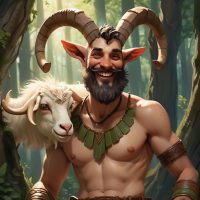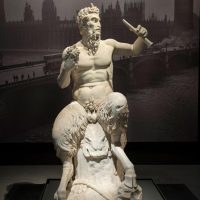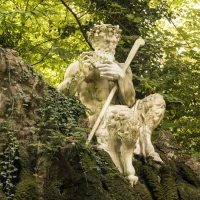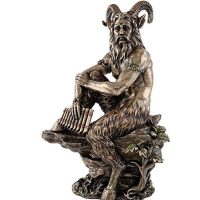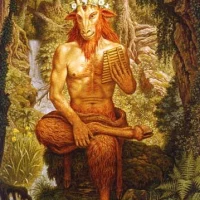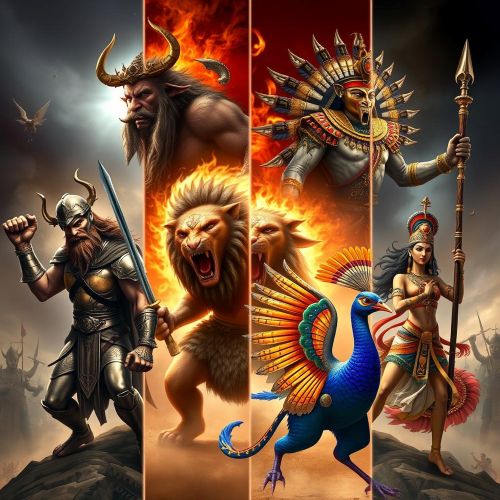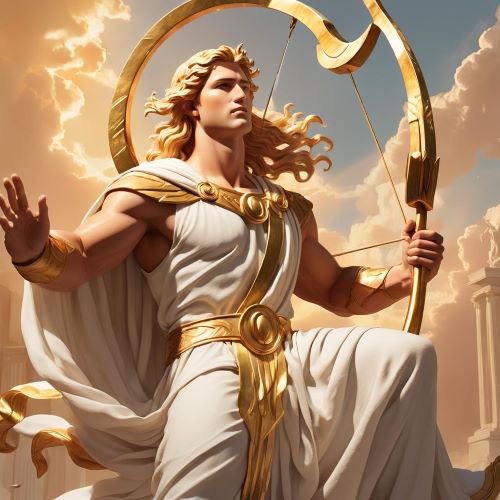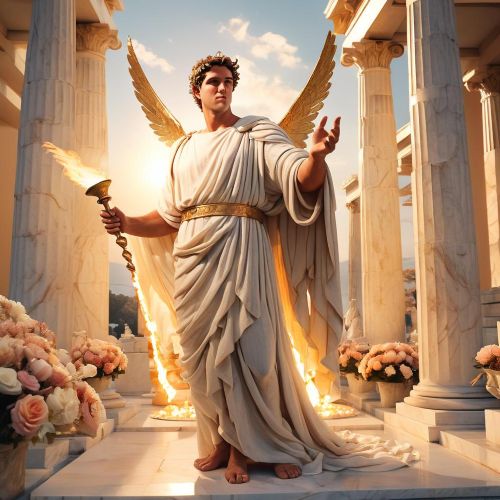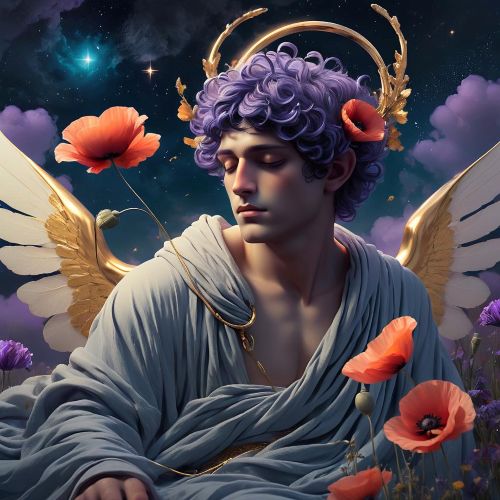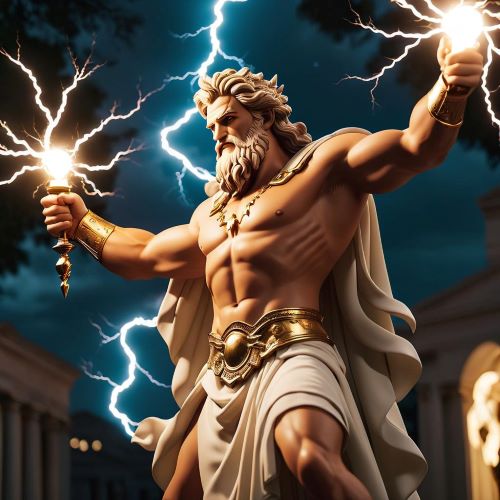Pan : God of the Wild
Listen
At a glance
| Description | |
|---|---|
| Origin | Greek Mythology |
| Classification | Gods |
| Family Members | Hermes (Father), Penelope (Mother) |
| Region | Greece |
| Associated With | Wild, Forests |
Pan
Introduction
Within the vast realm of Greek mythology, amidst its myriad gods and goddesses, Pan emerges as a figure of unparalleled allure and enigma. Portrayed as a being half-human, half-goat, he encapsulates the raw essence of the wilderness and the primal energies of nature. Revered as the deity of the wild, shepherds, and flocks, Pan’s image often features the hindquarters, legs, and horns of a goat, akin to the fauns and satyrs of lore. Hailing from the rustic landscapes of Arcadia, he reigns over fields, groves, and wooded glens, intricately intertwined with the fecundity of spring. Pan epitomizes the wild expanse, the stirring melodies of music, and the unbridled passions that pulse through existence. His character embodies complexity, veering between the fearsome guardian of shepherds and their charges and the impish trickster who roams the untamed hinterlands.
Physical Traits
Pan possesses a distinctive and unparalleled physical appearance. Typically depicted with the hindquarters, legs, and horns of a goat, his countenance exudes a unique blend of human and animal features. His face often reflects a goatish visage, complete with a rugged beard and a snout, mirroring his untamed nature. Endowed with hooved lower limbs, Pan traverses rugged terrains with unparalleled agility, his shaggy, hairy body adding to his rustic charm. This portrayal, characterized by a mischievous grin and piercing eyes, captures his playful yet unpredictable essence.
Over time, Pan’s physical depiction has evolved, transitioning from early renditions portraying him as entirely goat-like to later representations adopting a more humanized form. Despite this shift, the iconic image of Pan remains rooted in his dual nature, with a human upper body adorned with a thick beard and a sly smile, juxtaposed against his caprine lower body. Symbolized by his pointed horns, Pan’s physicality serves as a testament to his connection to fertility, the untamed wilderness, and the intrinsic power of the natural world.
Family
The lineage of Pan, though veiled in mystery, is subject to various interpretations and narratives within Greek mythology. One prevalent account proposes Hermes, the divine messenger, as his father, while attributing his motherhood to either Penelope, wife of Odysseus, or a nymph named Hybris, in tales associated with Zeus. Another intriguing tale suggests Pan’s conception during Odysseus’ prolonged absence, implicating Penelope’s relations with his suitors, echoing the etymology of Pan’s name, signifying “all” or “every.” Regardless of the differing genealogies, Pan’s connection to fertility and the natural world remains apparent, imbuing his character with a profound link to the realms he embodies.
Other names
In the enigmatic milieu of the Hellenistic era’s mystery cults, Pan assumes diverse identities, merging with Phanes/Protogonos, Zeus, Dionysus, and Eros, or occasionally multiplying into a multitude of Panes, or a triad consisting of Agreus, Nomios, and Phorbas. Throughout Greece, Pan’s essence transcends singular appellations, as he adopts various names reflecting his multifaceted character. In his native Arcadia, he is venerated as “Nomios,” the shepherd deity, while “Kroton” signifies his association with rams and the animal realm.
Epithets such as “Egleos” (the shining one) and “Lousios” (the washer) further elucidate his ties to specific natural phenomena. Notably, the Roman counterpart Faunus, sharing Pan’s traits, underscores the cross-cultural influence of this rustic figure. Across different epochs and regions, Pan assumes an array of epithets and titles. Often hailed as “The Great God Pan,” he embodies fertility, wilderness, and rustic melodies. Alternatively, the name “Faunus,” derived from the Latin “faunus” meaning “kindly,” highlights Pan’s protective role over shepherds and their flocks, accentuating his benevolent aspects.
Powers and Abilities
Pan’s abilities were as diverse as they were awe-inspiring. His formidable strength and stamina allowed him to traverse vast distances without fatigue, while his mastery over transformation enabled him to manipulate objects at will and teleport between Earth and Mount Olympus effortlessly. Renowned for his musical prowess, Pan crafted the panpipes, an instrument capable of evoking a myriad of emotions, from blissful euphoria to haunting melancholy. Moreover, Pan wielded a unique power to instill panic and fear with a mere shout, unsettling even the bravest souls and earning him a reputation as a harbinger of dread on the battlefield.
In addition to his musical talents and fear-inducing capabilities, Pan’s dominion extended over the natural world, where he served as a guardian of fertility and the circle of life. His agility and speed, inherited from his father Hermes, facilitated his navigation through the rugged wilderness of Arcadia, where he ensured the flourishing of flora and the reproduction of fauna. This amalgamation of abilities mirrored Pan’s untamed and unpredictable nature, embodying both the ferocity of the wild and the harmonious rhythms of nature’s song.
Modern Day Influence
The enduring legacy of Pan and Greek mythology permeates modern culture in myriad ways. Pan’s name serves as a wellspring of inspiration in popular culture, spawning a plethora of movies, books, and video games that draw upon ancient tales for narrative depth. Moreover, the architectural landscape often incorporates motifs from Greek mythology, echoing the grandeur of Olympus in prominent buildings.
Notably, Pan’s name found resonance in the creation of Peter Pan, the eternal youth of literature. While the era of Olympian gods has waned, Pan’s influence endures, manifesting in fantasy literature and role-playing games where the iconic image of a man with goat legs and horns evokes the untamed essence of nature. The haunting melodies of the panpipes, his signature instrument, continue to enchant as a cherished folk instrument, evoking the primal allure of the natural world.
The term “panic,” derived from Pan’s ability to instill fear, remains a poignant reminder of his formidable power. In literature, Pan symbolizes the untamed wilderness, embodying humanity’s primal instincts and the allure of the natural world. Renowned authors like J.M. Barrie and C.S. Lewis evoke Pan’s archetype to infuse their narratives with wonder and adventure.
In the realm of music, Pan’s mythical aura resonates through the haunting melodies of the pan flute, inspiring classical composers like Claude Debussy and contemporary artists like Andreas Vollenweider alike. Across various media, from film and television to video games and graphic novels, Pan’s captivating image endures, portraying him as both a mischievous trickster and a sage guardian of the wild, captivating audiences of all ages with his timeless allure.
Related Images
Frequently Asked Questions
What is lorem Ipsum?
I am text block. Click edit button to change this text. Lorem ipsum dolor sit amet, consectetur adipiscing elit. Ut elit tellus, luctus nec ullamcorper mattis, pulvinar dapibus leo.
What is lorem Ipsum?
I am text block. Click edit button to change this text. Lorem ipsum dolor sit amet, consectetur adipiscing elit. Ut elit tellus, luctus nec ullamcorper mattis, pulvinar dapibus leo.
What is lorem Ipsum?
I am text block. Click edit button to change this text. Lorem ipsum dolor sit amet, consectetur adipiscing elit. Ut elit tellus, luctus nec ullamcorper mattis, pulvinar dapibus leo.
What is lorem Ipsum?
I am text block. Click edit button to change this text. Lorem ipsum dolor sit amet, consectetur adipiscing elit. Ut elit tellus, luctus nec ullamcorper mattis, pulvinar dapibus leo.
What is lorem Ipsum?
I am text block. Click edit button to change this text. Lorem ipsum dolor sit amet, consectetur adipiscing elit. Ut elit tellus, luctus nec ullamcorper mattis, pulvinar dapibus leo.

